What is a Transloading Agreement? 5 Must-Have Elements for your Security in 2024
Keen to draft an effective transloading agreement?
This is a vital document that solves important transloading challenges and risks.
That said, creating a legally binding transloading agreement can be challenging without the basic understanding of important requirements & best practices.
A survey by Xeneta revealed that 34% of shippers create contracts to govern supply chain partnerships with carriers, transloaders and other partners. Such agreements help ensure safer collaboration.
This is why we’ll go over what a transloading agreement is so that you can understand how to get started drafting one. We’ll also cover important elements to include and best practices to follow to make it legally binding.
When you draft your transloading contract correctly, you’ll mitigate disputes and protect your business by setting clear expectations from the get-go.
If you’re thinking about transloading oil and are wondering what it entails, check out this article I wrote about crude oil transloading and shipping operations.
In this article, we’ll discuss what a transloading agreement is and must-have elements for your security in 2024 to legally protect your transloading business.
Let’s get started.
What is a transloading agreement?
A transloading agreement is a legal contract that governs transloading operations, and describes the processes, tasks and liabilities for every partner involved in the process.
It defines the obligations and expectations for your transload facility, shippers and carriers, among other partners, and also lays ground rules for the entire operation.
In order to avoid surprises and unexpected liabilities during transload shipping, it’s important that you know what to expect from your transloading agreement.
The shipper in this case is usually the party sending the freight from one point to another, and is also known as the consignor. That said, the shipper could also be a freight forwarder or broker acting on behalf of the shipper.
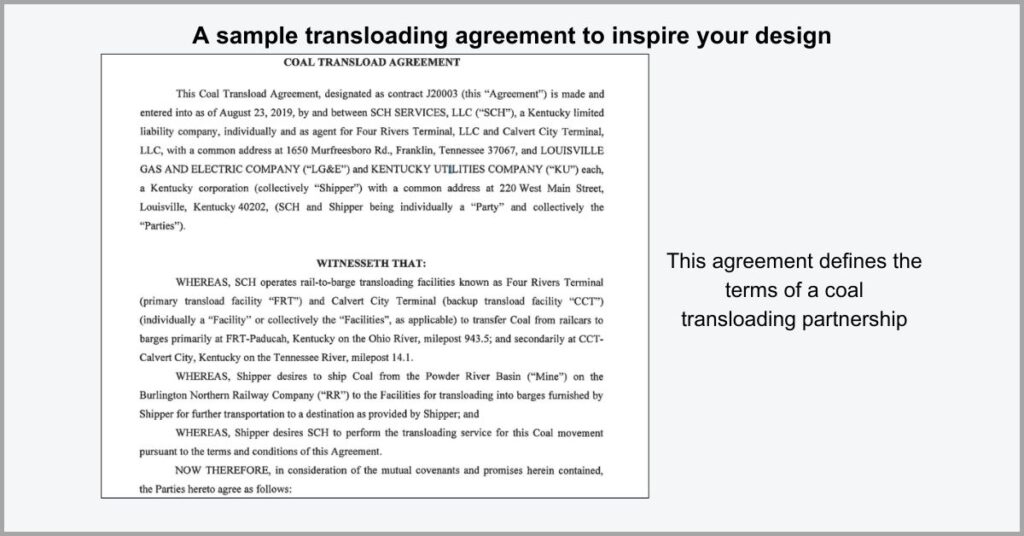
During your transload shipping process, the carrier is the party responsible for providing transportation services. They enable the professional conveyance of freight, and some examples of carriers include trucking and railroad companies.
So a transloading agreement describes what each of these different parties is supposed to do during the transloading process. It also assigns responsibilities & liabilities to streamline the coordination of the entire process and clarify important materials.
That said, digitizing shipping documents like transloading contracts and bill of ladings improves their accessibility, and a great transloading software can help you do that.
Click here to book your free transloads.co demo to see our software in action.
We’ll show you how to use key features like customizable document templates that enable you to create vital shipping documents efficiently and more accurately.
Must-have elements of a great transloading agreement
1. Identification of parties
Why is party identification important?
The most basic yet fundamental part of drafting a transloading agreement that’s legally binding is to comprehensively identify all relevant parties in the process.
When you fail to define the parties involved in your transloading contract, clarity and accountability issues arise, while the contract may also be invalidated.
Alarmingly, 44% of contract approvals stall because of bad information or errors, according to a study by DocuSign. One of the most prevalent mistakes that often arise is failing to identify the right parties relevant to the transloading process.
Beyond forcing contract reworks, such errors can also expose you to great risk in case a dispute arises.
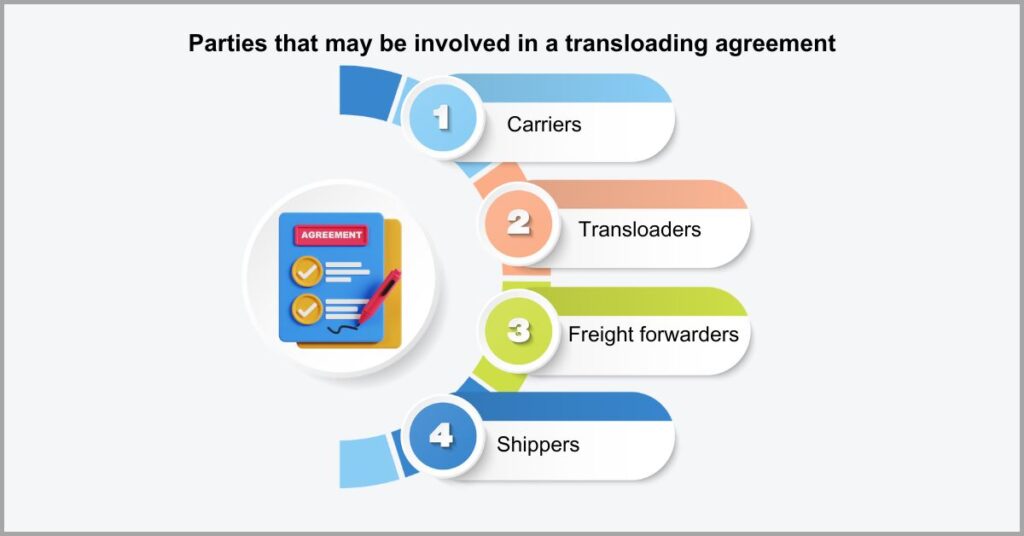
Therefore, it’s important to understand & define all parties involved in the process.
One of the first ones to remember when drafting the agreement is the shipper. This is the person or company responsible for coordinating the entire shipping process.
If there was an involvement of freight brokerage strategies, you’ll also want to ensure that freight brokers are also mentioned in the contract just to cover all your bases.
In the same vein, you should also mention freight forwarders in the agreement if they’ll be handling shipping operations on behalf of the shipper. By correctly identifying all relevant parties, you can create a valid contract that rightly enforces accountability.
2. Minimum volume commitment clause
Minimum volume commitment (MVC) is also very vital.
It’s a clause that defines a guaranteed frequency as well as amount or volume of freight that you’ll be transloading for the shipper across a defined period.
So minimum volume commitments ensure a steady flow of freight volumes, and failing to define one can lead to revenue losses for your transload facility.
A study by Trinity Logistics indicated that approximately 30% of carriers are concerned about low freight volumes in 2023. One strategy that can help you secure more long-term business is drafting a MVC clause into transloading contracts.
So it’s a key element for improving client loyalty and keeping your business profitable.
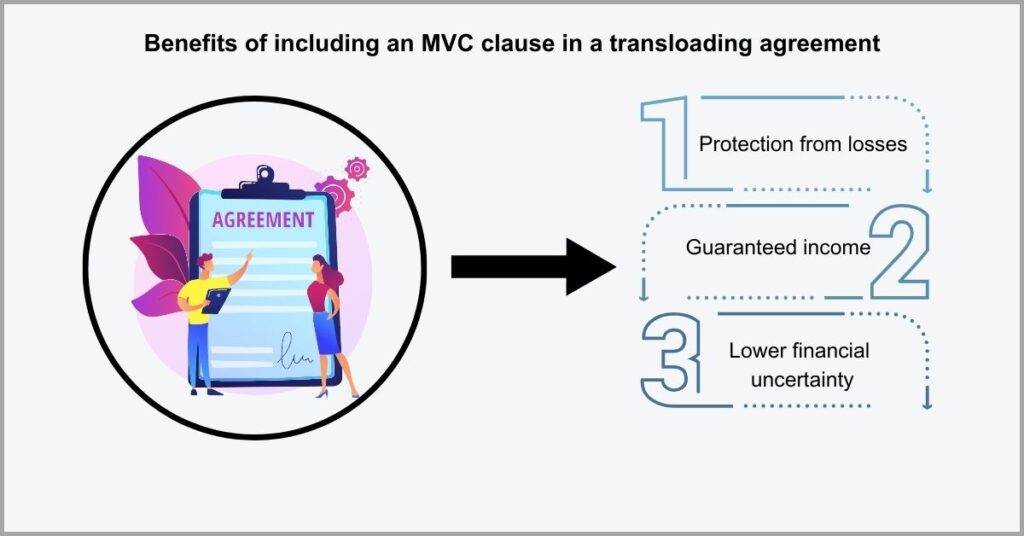
That said, an MVC benefits every party in the agreement.
From the shipper’s perspective, this clause gets them fixed & well-negotiated transloading rates, ensuring protection from surcharges during shipping.
For your transloading or drayage shipping business, the MVC clause helps to protect your bottom line. If the shipper does not meet their minimum volume requirements as per the agreement, you’ll be compensated by way of a shortfall fee.
This is typically calculated according to the shortfall of the minimum volume.
For example, if a shipper has an MVC clause that guarantees 10,000 pounds of coal per week, you can charge a base rate of say $3 for every pound below this target.
3. Demurrage charge clause
So what is a demurrage charge or penalty?
A demurrage charge is a fee that is levied upon the shipper when their shipment stays at a transload facility, port or rail terminal beyond an agreed free time period.
When customers fail to pick up containers and other goods you’ve transloaded on time, yard congestion can arise that lowers your transloading capacity.
A survey by Statista revealed that 36% of distribution centers cited insufficient space as a top challenge. This greatly lowered their profits since it limited the amount of inventory they could keep on site.
So it’s vital to ensure timely cargo pickups which is where demurrage clauses come in.
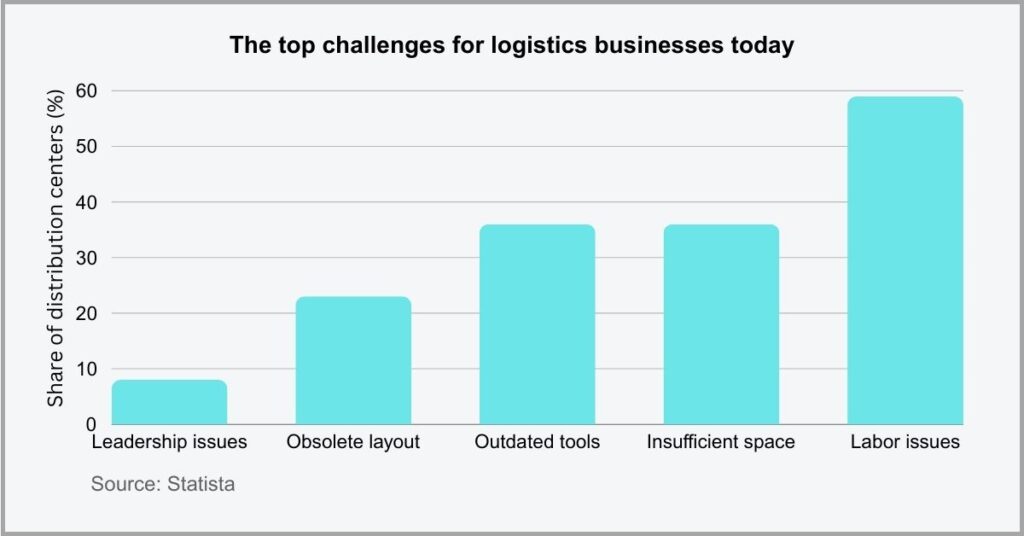
By drafting a demurrage charge clause into your transloading agreement, you can keep freight moving and optimize yard space utilization.
This clause should preferably offer a reprieve that includes a free length of time where you’ll not penalize temporary cargo storage. This is important for incentivizing new business and keeping your transload yard competitive.
That said, I recommend using the best software for warehouse management to track your inventory. If you have a demurrage traffic in place, these solutions can help you to calculate demurrage fees more accurately and efficiently.
In cases where railcars are involved, the agreement should also define who is responsible for paying demurrage fees to the rail company in case of detention.
4. Confidentiality clause
What is a confidentiality clause in a transloading agreement?
A confidentiality clause is a stipulation that protects information that you or the shipper would like to keep private. This can include details about proprietary software, trade secrets, intellectual properties and other important data.
Failing to include a confidentiality clause can dull the competitiveness of your transloading facility while compromising the privacy needs of shippers.
A study by NCSES discovered that 76.2% of businesses said protecting trade secrets is an important priority for them. This proves the need of including a confidentiality clause for the peace of mind of your customers, and its value in getting sales over the line.
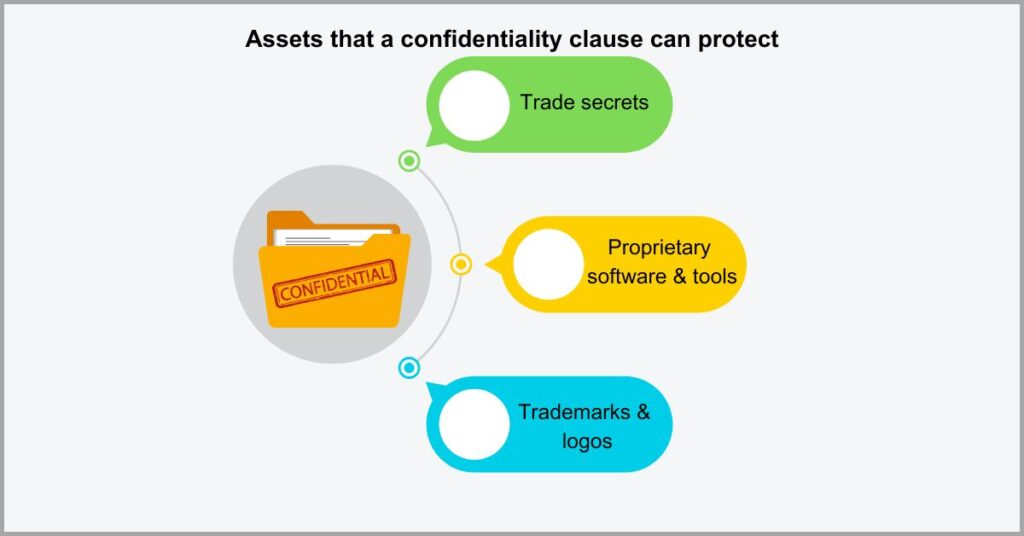
By stipulating non-disclosure terms, a confidentiality clause is a win-win for everyone.
It helps you assure customers that their product designs and shipping tactics remain confidential, while it protects proprietary transload shipping equipment and software to preserve your competitive advantage in the transloading industry.
That said, the devil is the detail when it comes to creating great transloading contracts, and seeking the experience of a trusted third-party can make a big difference.
Click here to get our premium consultancy services to improve your operations.
We can offer guidance to help you create a legally binding transloading agreement to protect your business and even optimize yard operations to boost your efficiency.
5. Force majeure clause
Natural disasters can occur during transloading.
This includes extreme weather events such as tornadoes, wildfires and floods, among others. A force majeure clause defines what should happen in such circumstances.
Otherwise, you may have to pay out of your own pocket for freight damages that occur during Acts of God, translating to huge losses for your business.
A survey by Breakthrough revealed that 39% of logistics businesses are very worried about extreme weather events in 2024. Some of the biggest fears stem around rising cases of tornadoes, floods, and earthquakes.
When such incidents take place, your transloading business can experience shipment damages that cause disputes with shippers and carriers.
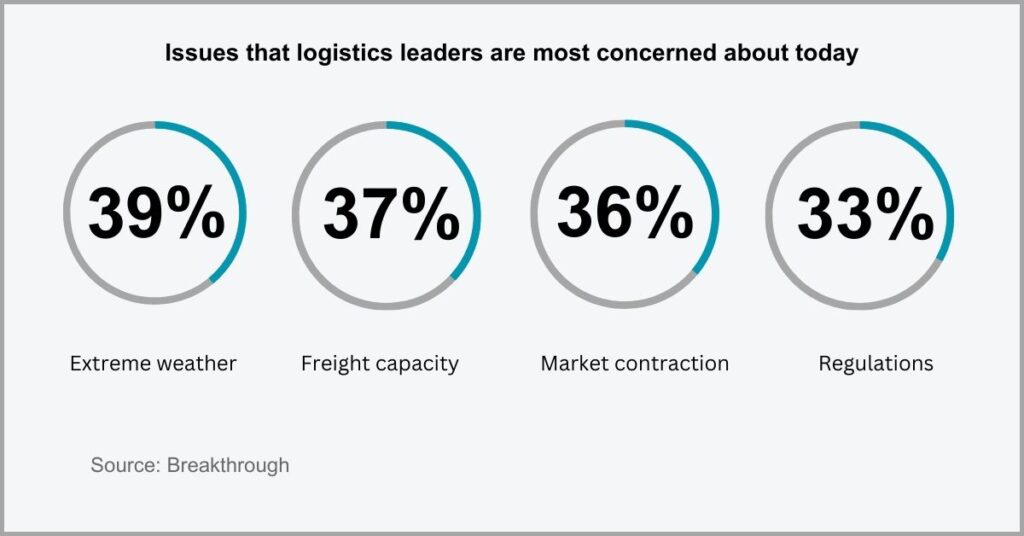
So how do you draft a great force majeure clause?
It should basically list all the potential natural events that could cause cargo damage.
And I’m not just talking about natural disasters alone, but also other events that can occur during transloading that are beyond your control. These include scenarios such as unanticipated government actions and labor disputes as well.
That said, it’s also important to get cargo insurance to help you out in such cases, depending on the types of freight transloading services you offer.
A great insurance cover can reimburse your customers the full value of their freight, thereby safeguarding your transload facility from losses and reputational damage.
Benefits of having a great transloading agreement
a. Mitigating double brokering
What is double brokering in the first place?
Double brokering is the illegal act of a freight broker passing on the responsibility of managing the shipment to another intermediary without the greenlight of the shipper.
The problem with double brokered loads is that they can invalidate cargo insurance, and also increase the risk of payment defaults for your business.
Unfortunately, a study by TIA revealed that 43% of businesses are very concerned about unlawful freight brokerage scams. One of the most rampant cases that has really gotten out hand of hand in recent times is double brokering.
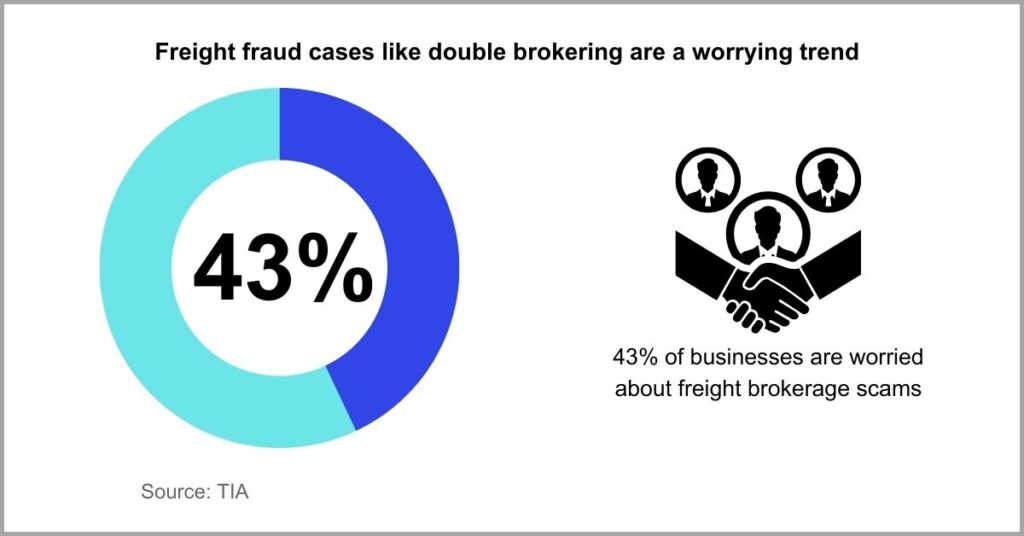
A transloading agreement, when well-drafted, can minimize double brokering risks.
It can provide protection against underhand freight brokerage strategies such as this and others to keep your transload facility safe from any legal fallouts.
For example, it’s possible to unknowingly handle and transload double-brokered goods that violate regulations by the Federal Motor Carrier Safety Administration (FMCSA). A great agreement can absolve blame in such cases to protect your business.
It may even go a step further to get you compensation in such cases if you include an indemnify clause so that you can recoup any wasted time and resources.
b. Appropriate remuneration for services
A shipper or freight forwarder can default on payments.
Alternatively, disputes may also arise that lead to shippers, forwarders or brokers negating on their word and paying you less than what you initially agreed upon.
Without a transloading agreement, your transloading business therefore runs the risk of receiving delayed or inaccurate remuneration for its services.
It’s very alarming to note that 55% of all B2B invoices are paid late, according to a survey by Atradius. A great deal of these invoices are even paid after the 90 day mark, with some of them not getting paid at all.
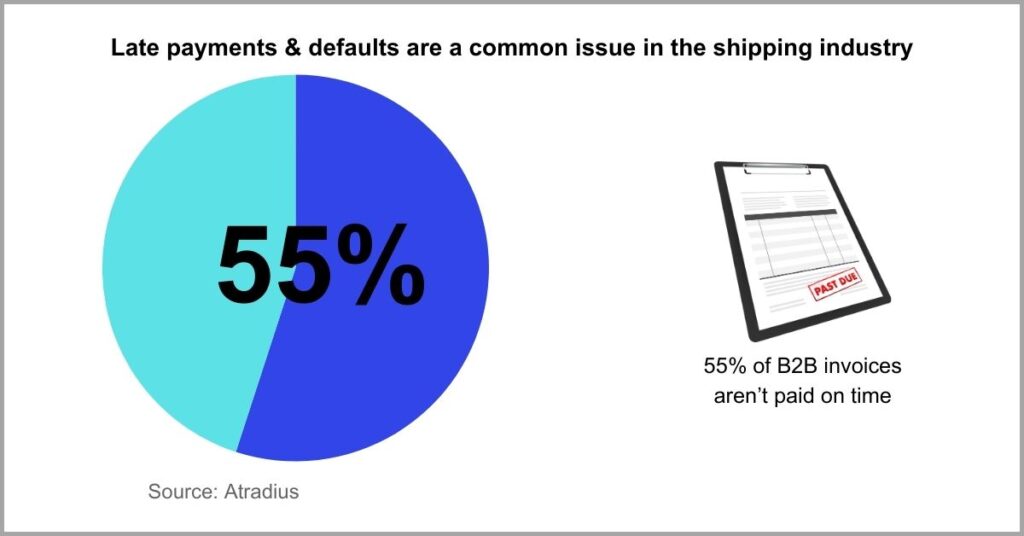
So how does the agreement help you get paid?
It’s a tactic that the best transload service companies use to ensure a minimum base rate for primary services. If a shipper doesn’t hold up their end of the bargain in terms of payment timeliness or amounts, you can successfully seek legal redress in court.
It also ensures you’re correctly paid for additional services incurred by stipulating additional charges that may kick in surplus to the original agreement.
For example, it can include demurrage penalties, railcar switching fees and even warehouse storage charges, among others, that may arise during the shipping process.
c. Faster dispute resolution
Court cases can easily run into years.
The back and forth involved during such lengthy litigation processes only complicates the process, attracting huge legal fees and expenses for your transloading business.
When dispute resolution takes too long and terms of recourse are unclear, attorney fees can divert significant financial resources from your cash flow.
A survey by NRF revealed that 50% of US business leaders were concerned about lengthy corporate litigation in 2023. In many cases, such proceedings take too long to conclude, sometimes taking up to thirty or more months to reach a verdict.
You can only imagine the legal fees you’ll have spent in that time.
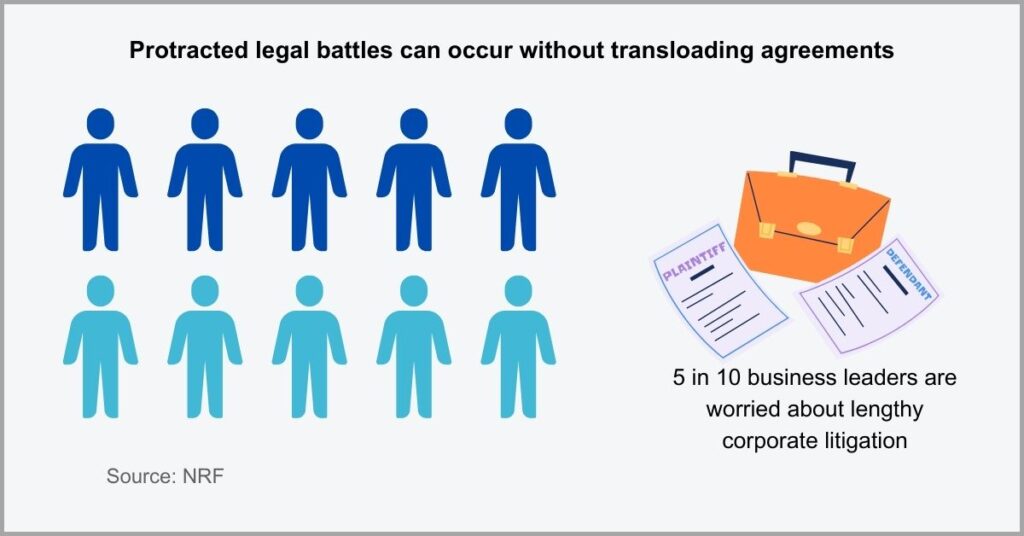
How does a transloading agreement streamline dispute resolution?
If you provide oil transload shipping services, for example, the agreement should stipulate arbitration methods and authorities to use relevant to the oil industry.
It should define and specify the applicable jurisdiction as per your unique shipping circumstances as well as the relevant governing laws that come into play.
By defining arbitration or litigation measures that are applicable in case the shipper or carrier violates the terms of your transloading agreement, you can speed up dispute resolution because of clear & well established pathways for dealing with the issue.
d. Improved regulatory compliance
What are your regulatory obligations as a transloader?
You have a number of regulatory requirements to observe, some of which include ensuring that all the freight you handle is properly marked, packaged and documented.
That said, failing to ensure the safe transloading and transportation of shipments attracts compliance risks and penalties that can easily cripple your business.
A survey by Lloyd’s list revealed that 45% of logistics businesses said regulatory risks and uncertainties are the biggest challenge they face. This made it the biggest threat for their business, alongside other issues like oversupply and disruptions.
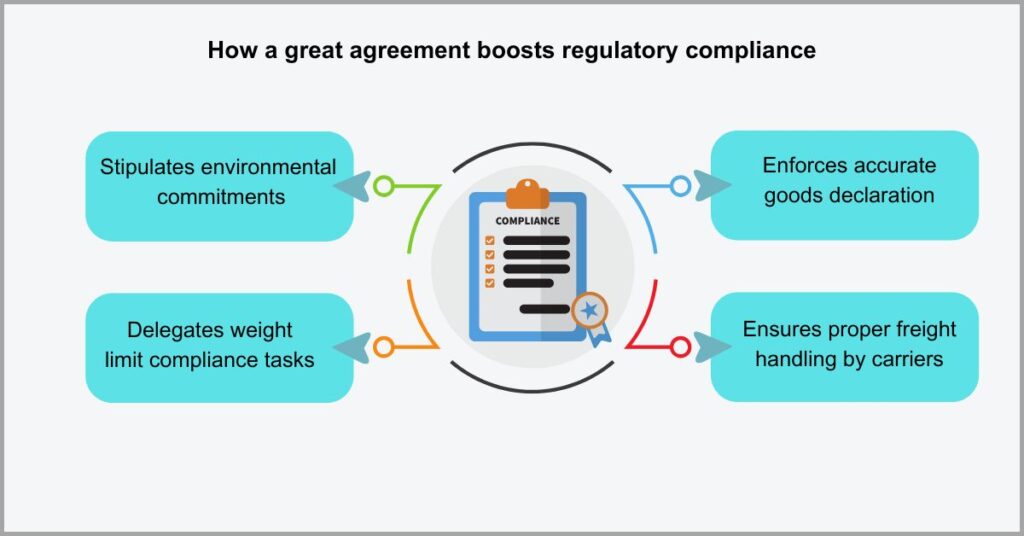
A transloading agreement can streamline regulatory compliance in several ways.
For instance, when you’re transloading and shipping coal, it can define compliance requirements and expectations for every party included. You can mandate shippers to ensure that their goods are properly marked and packaged according to regulations.
The contract can also delegate other important requirements to carriers such as ensuring that the bill of lading adequately describes the goods within containers. It can also describe key environment commitments & safety obligations for various partners.
Overall, a great transloading agreement enables you to delegate roles and assign responsibilities to seal compliance loopholes during the transload shipping process.
e. Stronger client relationships
Building great relationships is key to long-term success.
This is because it directly impacts how much business you can get from your transloading clients, while it also affects the reputation and image of your brand.
When client experiences with your transloading facility aren’t great, you’ll struggle with retaining profitable customers and attracting new ones too.
In fact, 32% of customers leave a brand after just one poor experience, according to a PWC survey. Some of these clients walk away after doing business with a brand for several years, showing that the stakes are high to get this right.
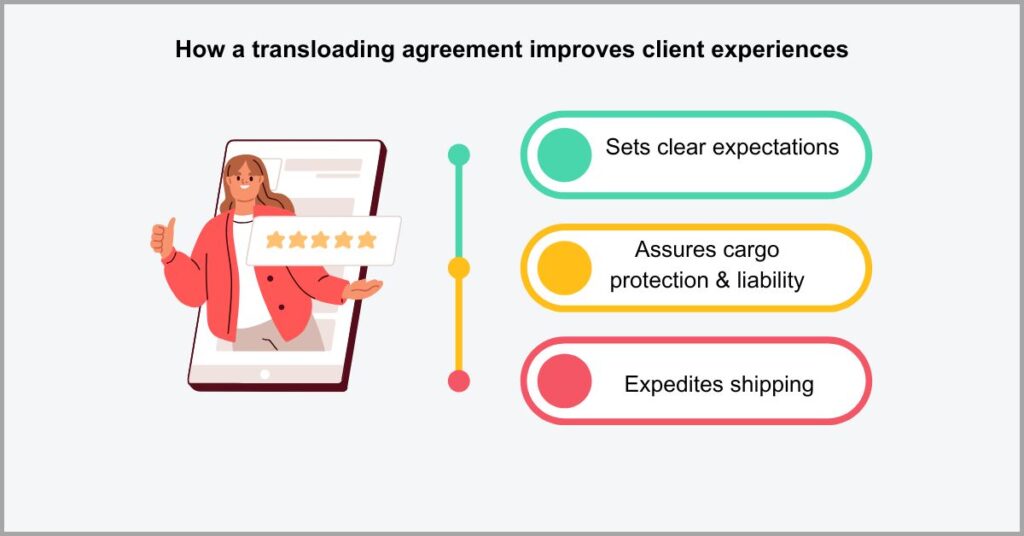
So how can a transloading agreement improve client experiences?
For one, it can help establish clear expectations from the start to avoid disappointments. If you offer butane transloading shipping, for example, but don’t provide warehousing, stipulating this in the contract ensures no surprises down the road.
With elements like the confidentiality clause and cargo damage liabilities, you can also give customers a guarantee of safety and privacy. This helps you to win their trust, especially when you also consistently observe the terms of the agreement
More importantly, the agreement also ensures everyone upholds their end of the deal, creating a seamless shipping experience that boosts confidence in your business.
Conclusion
Transloading agreements go both ways.
They also define obligations you need to uphold to alleviate risks for customers.
Failing to abide by the terms of your transloading agreement can cause customers to terminate the contract and take their business elsewhere.
In fact, a WTW survey showed that 44% of shippers would terminate contracts with supply chain partners due to faults that caused supply chain disruptions. So it’s important to ensure that you honor your transloading agreement.
Investing in the right technology can make a big difference, enabling you to draft and digitize agreements to improve contract visibility. As a result, you’ll always be aware of your obligations and can therefore coordinate transload operators accordingly.
Click here to book your free transloads.co trial to learn more about our software.
We’ll show you how you can use our platform to digitize shipping documents like transloading agreements and manage transload operations & workers more efficiently.

